-
Product Name:
Liposomal Curcumin
-
Molecular Formula:
C21H20O6
-
Molecular Weight:
368.4 g/mol
-
CAS No.:
969516
-
HSN Code:
13021919
-
CID Code:
969516
-
Shelf Life:
3 years - 20°C powder
-
DrugBank ID
DB11672
-
UNII No.
IT942ZTH98
- USP
- IUPAC Names
- Synonyms
USP of Liposomal Curcumin
- Liposomal curcumin protects curcuminoids with phospholipids for better absorption.
- Nanoscale liposomes improve gut barrier penetration.
- It boosts bioavailability without piperine.
- Liposomes merge quickly with cell membranes.
- Encapsulation prevents curcuminoid oxidation.
- High bioavailability makes small doses effective.
IUPAC Names of Liposomal Curcumin
(1E,6E)-1,7-bis(4-hydroxy-3-methoxyphenyl)hepta-1,6-diene-3,5-dione
Synonyms of Liposomal Curcumin
- Diferuloylmethane
- curcumin
- 458-37-7
- Natural yellow 3
- Curcuma
- Curcumin I
- Souchet
- Haidr
- Halad
- Halud
- Yellow Ginger
- (1E,6E)-1,7-Bis(4-hydroxy-3-methoxyphenyl)hepta-1,6-diene-3,5-dione
- C.I. Natural Yellow 3
- Yellow puccoon
- Golden seal
- Diferaloylmethane
- Curcumine
- Hydrastis
- Tumeric yellow
- CI Natural Yellow 3
- Kurkumin
- Curcumin (synthetic)
- Zlut prirodni 3
- Jianghuangsu
- Zlut prirodni 3
- Cucurmin
- 94875-80-6
- Tumeric oleoresin
- (1E,6E)-1,7-Bis(4-hydroxy-3-methoxyphenyl)-1,6-heptadiene-3,5-dione
- NSC 32982
- 1,7-Bis(4-hydroxy-3-methoxyphenyl)-1,6-heptadiene-3,5-dione
- CCRIS 3257
- CHEBI:3962
- Curcurmin
- Lipocurc
- Kurkum
- 1,5-Di(vanillyliden)acetylaceton
- CI 75300
- NCI-C61325
- 1,5-Divanillyliden-2,4-pentandion
- UNII-IT942ZTH98
- Curcumin e100
- NSC 687842
- trans,trans-Curcumin
- BRN 2306965
- IT942ZTH98
- 1,9-Bis(4-hydroxy-3-methoxyphenyl)-2,7-nonadiene-4,6-dione
- 1,6-Heptadiene-3,5-dione, 1,7-bis(4-hydroxy-3-methoxyphenyl)-, (E,E)-
- 1,7-Bis(4-hydroxy-3-methoxyphenyl)hepta-1,6-diene-3,5-dione
- CHEMBL140
- NSC-687842
- (E,E)-1,7-bis(4-Hydroxy-3-methoxyphenyl)-1,6-heptadiene-3,5-dione
- SMR000058237
- 1,6-Heptadiene-3,5-dione, 1,7-bis(4-hydroxy-3-methoxyphenyl)-, (1E,6E)-
- DTXCID901421
- 4-08-00-03697 (Beilstein Handbook Reference)
- 1,6-Heptadiene-3,5-dione, 1,7-bis(4-hydroxy-3-methoxyphenyl)-
- curouma
- NCGC00017159-05
- kachs haldi
- 2,7-Nonadiene-4,6-dione, 1,9-bis(4-hydroxy-3-methoxyphenyl)-
- safra d’inde
- (1E,6E)-1,7-bis(4-hydroxy-3-methoxy-phenyl)hepta-1,6-diene-3,5-dione
- (1E,6E)-1,7-bis[4-hydroxy-3-(methyloxy)phenyl]hepta-1,6-diene-3,5-dione
- Tumeric
- 1,7-BIS-(4-HYDROXY-3-METHOXYPHENYL)-HEPTA-1,6-DIENE-3,5-DIONE
- CAS-458-37-7
- Phytosome, CurcuminCCRIS 5804
- C Yellow 15
- SR-01000000149
- Curcumin (Standard)
- Curcumin, analytical standard
- MLS001148449
- cid_969516
- Curcumin, >=94% (curcuminoid content), >=80% (Curcumin)
- 1,7-bis(4-hydroxy-3-methoxyphenyl)-1,6-heptadien-3,5-dione
- 1,7-bis(4-hydroxy-3-methoxyphenyl)1,6-heptadiene-3,5-dione
- Curcumin, matrix substance for MALDI-MS, >=99.5% (HPLC)
- Curcumin, United States Pharmacopeia (USP) Reference Standard
- 1,7-BIS(4-HYDROXYMETHOXYPHENYL)-1,6-HEPTADIENE-3,5-DIONE
- 1,7-Bis-(4-hydroxy-3-methoxy-phenyl)-hepta-1,6-diene-3,5-dione
- 1,7-bis-(4-hydroxy-3-methoxyphenyl)-1,6-heptadiene-3,5-dione
- ((E,E)-1,7-bis(4-hydroxy-3-methoxyphenyl)-1,6-heptadiene-3,5-dione)
- (1E,6E)-1,7-bis(3-methoxy-4-oxidanyl-phenyl)hepta-1,6-diene-3,5-dione
- (1E,6E)-1,7-Bis(4-hydroxy-3-methoxyphenyl)-1,6-heptadiene-3,5-dione #
- (1E,6E)-1,7-Bis-(4-hydroxy-3-methoxy-phenyl)-hepta-1,6-diene-3,5-dione
- (1Z,6E)-1,7-Bis-(4-hydroxy-3-methoxy-phenyl)-hepta-1,6-diene-3,5-dione
- 1,7-Bis(4-hydroxy-3-methoxyphenyl)-1,6-heptadiene-3,5-dione, (E,E)-
- 5-hydroxy-1,7-bis(4-hydroxy-3-methoxyphenyl)-1,4,6-heptatrien-3-one
- 5-Hydroxy-1,7-bis-(4-hydroxy-3-methoxy-phenyl)-hepta-1,4,6-trien-3-one
- Curcumin; 1,7-Bis(4-hydroxy-3-methoxyphenyl)-1,6-heptadiene-3,5-dione
- (1E,4Z,6E)-5-Hydroxy-1,7-bis-(4-hydroxy-3-methoxy-phenyl)-hepta-1,4,6-trien-3-one
- 207-280-5

Description of Liposomal Curcumin
Liposomal curcumin in powder form is an innovative formulation where curcumin, the key polyphenolic compound extracted from Curcuma longa (turmeric), is encapsulated within dried phospholipid liposomes. Chemically, curcumin features a hydrophobic structure with a conjugated diketone core and aromatic rings, making it poorly soluble in water and prone to degradation. The liposomes, typically formed from phospholipids like phosphatidylcholine, create a protective matrix around curcumin, which is then dehydrated into a fine, dry powder.
Physically, this powder appears as a yellowish-orange solid, reflecting curcumin’s natural pigmentation, with a lightweight, free-flowing texture. The liposomal structure enhances curcumin’s stability against oxidation and improves its dispersibility when mixed with liquids, offering a significant advantage over conventional curcumin powder in terms of preservation and bioavailability. As a leading API manufacturer, WBCIL prioritizes strict CGMP and ISO quality control measures throughout the production process. The prolonged experience from 1962 ensures consistent potency, purity, and safety in every dose of WBCIL’s liposomal curcumin.
Uses of Liposomal Curcumin
- Anti-inflammatory therapy: Used in treating chronic inflammatory diseases such as arthritis, IBD, and psoriasis.
- Cancer adjunct therapy: Investigated for its role in sensitizing tumors to chemotherapy and inhibiting tumor growth.
- Neuroprotective agents: Supports cognitive function and is studied for potential use in Alzheimer’s and Parkinson’s.
- Cardiovascular health: May help reduce oxidative stress and improve endothelial function.
- Liver protection: Acts as a hepatoprotective agent in cases of hepatic fibrosis and NAFLD.
- Antimicrobial properties: Effective against various bacterial, viral, and fungal infections due to improved absorption.
- Dietary supplements: Available in capsules or sachets to support joint, brain, and immune health.
- Fortified foods: Added to yogurts, cereals, and bars as a bioavailable antioxidant ingredient.
- Anti-inflammatory: Liposomal curcumin reduces skin inflammation by inhibiting key inflammatory pathways, making it effective in acne, eczema, and psoriasis.
- Antioxidant: It protects skin cells from oxidative stress and premature aging by scavenging reactive oxygen species (ROS).
- Wound healing: It accelerates wound closure and promotes collagen synthesis, aiding in faster and improved skin regeneration.
- Antimicrobial: Liposomal curcumin inhibits the growth of acne-causing and pathogenic microbes, supporting clearer and healthier skin.
- Anti-aging: It enhances skin elasticity and reduces fine lines by preserving collagen and preventing oxidative damage.
- Depigmentation: It inhibits melanin production, helping to lighten hyperpigmented areas and even out skin tone.
- Photoprotection: Liposomal curcumin mitigates UV-induced skin damage and inflammation, offering natural sun protection benefits.








